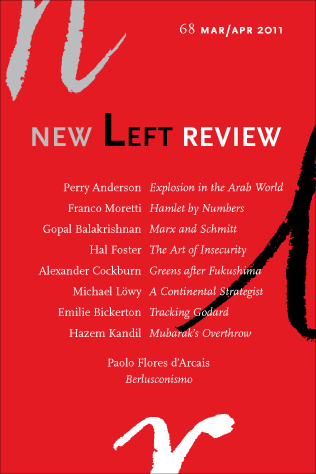From Tunis to Manama, 2011 has brought a chain-reaction of popular upheavals, in a region where imperial domination and domestic despotism have long been entwined. A call for political liberty to reconnect with social equality and Arab fraternity, in a radical new internationalism.
An Egyptian sociologist gives an in-depth account of Mubarak’s overthrow, from the social tensions of the dictatorship’s final years to the present ferment of transition. The old regime’s structures of rule, and the prospects for the new dispensation emerging from its shadow.
Contra Benno Teschke’s critique of Carl Schmitt in NLR 67, Gopal Balakrishnan argues that bourgeois society’s constitutive separation of the political and economic was a central problematic for the strategist of the intransigent right.
Risks of reactor meltdown on America’s ring of fire, and delusions of mainstream greens seeking climate solutions in the embrace of the nuclear-industrial complex.
What can quantitative methods tell us about literary plots? Franco Moretti maps character networks from Shakespeare, Dickens and Cao Xueqin to shed light on questions of sovereignty, legitimacy and the reciprocity of social relations.
The work of Thomas Hirschhorn as artistic primer for a precarious world. Appeals for explanation and engagement in makeshift monuments or plaintive placards, while overflowing installations lay bare the excesses of late capitalism.
Anatomy of the system built by Berlusconi, itemizing its pathologies and corruptions, to gauge their implications for society and constitution alike. A Putinism re-tooled for Western Europe?
Michael Löwy on Emir Sader, A Nova Toupeira. Cycles of revolution in Latin America—laboratory both of neoliberalism and its challengers.
Emilie Bickerton on Antoine de Baecque, Godard, biographie. Life and work of Europe’s greatest living visual artist.
